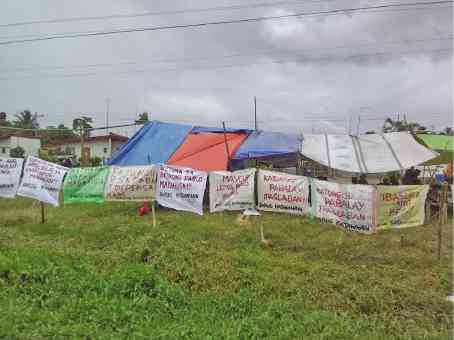
Streamers voicing appeals for government housing aid are displayed in a housing project for survivors of Typhoon “Pablo” (international name: Bopha) in Maparat village, Compostela town. —FRINSTON LIM
COMPOSTELA, Compostela Valley—Hundreds of occupants of a government housing project for survivors of Typhoon “Pablo” (international name: Bopha) in this town are appealing to the government to let them stay for good in the houses amid an impending eviction by the National Housing Authority (NHA) which had described the settlers as illegal.
Settlers had entered the San Antonio NHA Housing Project in Maparat village in November after many of the 2,500 units were kept vacant more than two years after being completed, said Vilma Cadiao, spokesperson of Barug Katawhan-Compostela.
“Why can’t the government allow us to live in these houses? We’re typhoon (survivors) too,” Cadiao said.
She accused the local government of political patronage in identifying beneficiaries.
But Compostela Mayor Lema Bolo said Cadiao’s group was illegally occupying the houses.
Told a lie
“Their occupation is unfair on the part of the rightful beneficiaries who could not move in because the illegal settlers were already there,” Bolo told the Inquirer last week.
Before the occupation, the settlers said they had asked the local government to be listed as beneficiaries, too, because they also lost houses.
But the group, said Cadiao, was told “there were no more slots available.”
“But when we entered the area, many units were still idle,” said Jucema Locquiao, resident of San Jose village.
Locquiao said some of the beneficiaries chosen by the local government were not poor and could afford to build their own homes.
“We’re not fools to insist on staying here if only we have a place to go,” said Amy Laraga, resident of Poblacion village who lost her home to floods.
Many of the settlers work in banana plantations in Compostela.
Cadiao said the group would stand its ground and fight eviction.
The NHA, through its regional office in Davao City, had issued three eviction notices to the settlers.
The settlers accused the NHA of moving too slowly and not properly screening beneficiaries.
Of the 2,500 units, 949 are still not allocated, according to Jovelyn Abucayon, of the local government’s shelter program.
But all of the houses already have owners and raffles of units are done only to pinpoint exact locations of beneficiaries’ houses, Bolo said.
Josephine Ata, president of the San Antonio NHA homeowners’ association, said the contractor was committed to “rectifying structural defects in some of the units,” which had been cited as reason the units were unoccupied.
Ata, who works for Verlin Construction, the main contractor of the P550-million housing project, said many of the complaints of the beneficiaries and even illegal settlers were “being acted upon.”
Vandalism
“Many of the remaining units have missing doorknobs, jalousies and other parts because of theft or vandalism as a result of being idle for more than two years,” Ata said.
The San Antonio project is among the NHA’s resettlement areas for Compostela Valley residents rendered homeless by Pablo.
At least P5.6 billion had been allocated by the then Aquino administration for the construction of homes for 14,089 families in Compostela Valley and at least 3,391 in Davao Oriental.
Provincial lawmakers had blamed the low occupation rate at the San Antonio project on red tape at the NHA.
Ata said settlers could be exploited by opportunists, pointing to the number of settlers that had swelled to 1,000.
Reports about different groups of illegal settlers being financed by syndicates were circulating, Ata said.
But Cadiao, leader of the settlers, said her group had gotten rid of “freeloaders” and kept only those who were “really poor and homeless Pablo survivors.”
“We can’t play favorites. We don’t use this for political gain,” Bolo said.